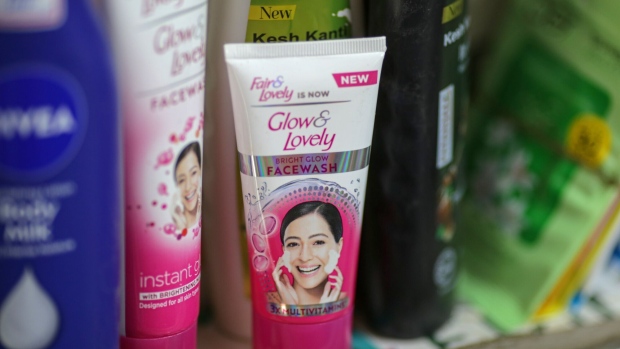Apr 24, 2024
Unilever India Misses Profit Estimate as Demand Stays Sluggish
, Bloomberg News

(Bloomberg) -- Hindustan Unilever Ltd. posted a slightly underwhelming quarterly profit as continuing demand slack weighed down the consumer goods giant that’s also battling rising competition from niche, local rivals.
The Mumbai-based unit of Unilever Plc reported a 5.5% fall in net income to 24.1 billion rupees ($289 million) for the quarter ended March 31 compared with the same period a year ago, according to an exchange filing Wednesday. That fell a tad short of the average analyst estimate of 24.79 billion rupees based on a survey compiled by Bloomberg.
Revenue came in at 146.9 billion rupees, also missing estimates. Total costs inched up 0.9% to 118.1 billion rupees, compared with the year-ago quarter. Volume growth was at 2% down from 4% last year, the filing said.
The disappointing earnings signal that headwinds remain strong for India’s largest staple goods maker which is caught between sluggish rural demand on one hand and fickle, premium buyers who are pivoting away, on the other.
Hindustan Unilever — seen as a bellwether for consumer demand in India as its household products are sold in every part of the country — is expecting an above-normal monsoon this year to boost rural incomes and its outlook.
Read More: India Sees Abundant Monsoon Rain in Boost to Economic Growth
“I am optimistic of consumer demand gradually improving due to a normal monsoon and better macro-economic indicators,” Chief Executive Officer Rohit Jawa said in the earnings statement. The company is also “re-shaping” its portfolio to focus on “high growth spaces,” he added.
Hindustan Unilever’s home care revenue rose 1.4% to 57.2 billion rupees in the March quarter while food and refreshment rose 3.2% to 39.1 billion rupees. Beauty and personal care — a segment where it’s seeing the maximum competition from niche upstart brands — saw its revenue fall 2.7% to 50.5 billion rupees.
Read More: Picky Consumers Jilting Big Brands Are Unilever India’s New Risk
The consumer giant said in its investor presentation that it’s working to improve performance of its skin cleansing products, such as soap and body wash, through measures such as price cuts and intensifying innovations to lure affluent customers.
Clawing Back
“We have lost market share in mass detergent bar and mass skin cleansing,” Ritesh Tiwari, chief financial officer, told reporters in a briefing. He added that the company has “done correction in pricing for skincare” that will help claw back some of the lost market share in the next few quarters. “You’ll see more innovation from us” in the segments targeting the elite and well as the aspirational middle class buyers.
Over the past year, the company has been introducing several new premium products, including Lakme cosmetics and spending more on advertising. It’s also exploring spinning off its ice-cream business into a separate unit, according to a media report this month.
Rural demand has started to grow but the recovery will be a gradual one, according to Tiwari.
Besides monsoon, the consumer demand in the coming quarters will depend on the impact of election-time government spending, anticipated heat waves and the agricultural yields, according to an April 8 note from brokerage Nirmal Bang Securities Pvt.
Hindustan Unilever on Wednesday also announced its highest-ever dividend at 24 rupees per share. That should cheer its investors a little as the stock has slipped about 15% this year while the country benchmark has climbed.
Read More: Unilever India Is Losing Foreign Shareholders on High Valuations
It’s also losing favor with global investors. Foreign funds reduced their shareholding to 12.7% at the end of March, down from as high as 14.5% in June last year, according to data compiled by Bloomberg.
(Updates with CFO comment in the ninth paragraph.)
©2024 Bloomberg L.P.


